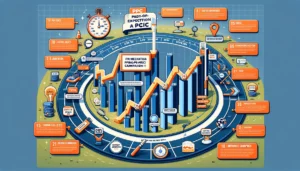Does PPC work immediately? Unveiling the Timelines for Pay-Per-Click Success

Does PPC work immediately? Pay-Per-Click (PPC) advertising is a dynamic component of digital marketing, offering the allure of quick results and budget flexibility. Success in PPC requires a strategic blend of planning, analysis, and continuous refinement. Understanding the nuances of PPC management can significantly enhance the ROI of your campaigns, making it essential to grasp the timelines and strategies for effective pay-per-click success.
Key Takeaways
- PPC advertising can provide immediate traffic, but strategic planning and continuous optimisation are key for long-term success.
- The effectiveness of PPC campaigns is greatly influenced by the choice of keywords, bidding strategies, and the use of advanced analytics.
- Aligning PPC goals with business objectives ensures that campaigns contribute meaningfully to overall marketing success.
- A partnership with a competent PPC management service can offer tailored strategies that balance immediate impacts with sustainable growth.
- Complementary marketing strategies, such as email marketing and SEO, can synergise with PPC to enhance overall digital marketing efforts.
Does PPC work immediately? Decoding the Timeline of PPC Results
Setting Realistic Expectations for PPC Campaigns
When you embark on the journey of Pay-Per-Click (PPC) advertising, it’s vital to anchor your expectations in reality. Immediate surges in traffic can be thrilling, but true PPC success is a marathon, not a sprint. It’s about sustainable growth, not just fleeting spikes.
Patience is your ally here. A well-structured PPC campaign may take several weeks or even months to fine-tune and yield optimised results. During this period, you’ll gather invaluable data, refine your targeting, and incrementally improve your return on investment (ROI).
Consider these key points to set realistic expectations:
- Initial data collection is crucial for informed decision-making.
- Early results will guide the continuous refinement of your campaigns.
- Achieving an optimal cost-per-acquisition (CPA) takes time and testing.
Remember, a strategic approach to PPC will not only aim for immediate wins but also build a foundation for long-term success and scalability.
Does PPC work immediately? The Immediate Impact vs. Long-Term Growth
When you launch a PPC campaign, you might be tempted to expect instant gratification. However, it’s crucial to understand that while PPC can indeed provide immediate visibility and traffic, the true measure of success lies in sustainable growth. Immediate results can be thrilling, but they are just the beginning of what can be a steady climb to long-term profitability.
Long-term growth in PPC is not just about maintaining a position; it’s about improving it. This involves a continuous cycle of testing, learning, and optimising. Consider the following points to balance the immediate impact with long-term growth:
- Lifetime Value (LTV): Assess the long-term value of acquired customers. A successful campaign not only brings immediate revenue but also contributes to LTV.
- Cost Control: Monitor campaign costs closely. Adjust bids, budgets, and targeting to optimise spending.
Remember, a small increase in conversion rate can significantly impact campaign success. Conversion Rate Optimisation (CRO) is a critical component of long-term PPC growth.
By staying ahead of changes in the market and consumer preferences, you can produce more relevant and engaging ad content, raising the possibility of conversion. This foresight ensures that your advertising funds are directed to the most promising prospects, securing not just a quick win but a strategic victory.
Key Factors Influencing PPC Success Timelines
When you embark on a PPC journey, understanding the key factors that influence success timelines is crucial. Your choice of a PPC ad agency can make or break your campaign’s effectiveness. Look for an agency with a proven track record, one that understands your industry and can tailor strategies to your specific needs.
Experience and expertise are non-negotiable; they are the bedrock of any successful PPC campaign. A seasoned agency will navigate platforms like Google Ads with finesse, ensuring your investment yields the best possible ROI. But it’s not just about past success; the agency’s approach to continuous optimisation and their use of cutting-edge tools and technology are equally important.
Remember, a PPC campaign is not a set-it-and-forget-it endeavor. It requires ongoing management and refinement to adapt to market changes and trends.
Consider these factors in a structured manner:
- Experience: How long has the agency been in business? Do they have a portfolio of successful campaigns?
- Expertise: Are they certified or recognised in the field of search engine marketing?
- Customisation: Does the agency offer strategies tailored to your business goals and audience?
- Technology: What tools and technologies do they employ to track and optimise campaigns?
- Adaptability: How well does the agency respond to market changes and adjust strategies accordingly?
Does PPC work immediately? Strategic Planning for PPC Success
Aligning PPC Goals with Business Objectives
To harness the full potential of PPC, your goals must be intricately woven into the fabric of your business objectives. Begin by employing the SMART framework to ensure your PPC objectives are Specific, Measurable, Achievable, Relevant, and Time-bound. This strategic alignment is the cornerstone of PPC success, guiding your campaigns with precision and purpose.
PPC agency expertise is pivotal in translating your business vision into actionable PPC strategies. A London PPC agency with a deep understanding of your market can tailor campaigns that resonate with your local audience, while also scaling to broader demographics as needed. The right agency will not only manage your campaigns but also conduct a thorough PPC audit to refine and enhance your approach.
Your PPC management should be a reflection of your business’s unique needs and aspirations. It’s not just about clicks and conversions; it’s about creating a sustainable growth engine that propels your brand forward.
Consider these critical steps for aligning your PPC goals:
- Identify your core marketing objectives, whether it’s boosting brand awareness, driving sales, or generating leads.
- Collaborate with your chosen agency to develop a PPC strategy that’s in harmony with your business goals.
- Implement a detailed plan with milestones and review points to ensure your campaigns are on track.
Remember, the right PPC partner is one that not only understands your vision but possesses the capability to actualise it through strategic and effective PPC management.
Does PPC work immediately? The Importance of Keyword Research and Selection
At the heart of your PPC campaign lies the pivotal task of keyword research and selection. Understanding user intent is not just about identifying popular search terms; it’s about delving into the motivations behind those searches. By doing so, you can align your ads with the needs and desires of your target audience, ensuring that your campaign resonates on a deeper level.
Keyword selection is not a one-time event but an ongoing process. As market dynamics shift and consumer behavior evolves, so must your keyword strategy. Regularly updating your keyword list is crucial to maintaining relevance and competitiveness in the digital marketplace. Consider the following steps to refine your keyword selection:
- Identify core keywords that are central to your business offerings.
- Expand your list with long-tail keywords that capture specific user intents.
- Analyse search volume and competition to prioritise your keywords.
- Utilise keyword research tools to uncover new opportunities and trends.
Remember, the right keywords can bridge the gap between your PPC ads and the most valuable prospects. They are the linchpins that can unlock the door to campaign success.
As you embark on this meticulous journey, keep in mind that the ultimate goal is to drive conversions, not just clicks. Your keywords should not only attract traffic but also lead to meaningful engagement and actions. This is where the art of keyword research truly shines, transforming a simple search into a strategic business opportunity.
Continuous Optimisation: The Path to Improved ROI
As you delve into the world of PPC, understand that continuous optimisation is your steadfast ally in the quest for improved ROI. It’s not a one-time setup; rather, it’s an iterative process that demands your attention and action. Regularly review your campaign’s performance, keeping a keen eye on trends and underperforming areas. Adjust your strategies to these insights, always aiming for enhancement.
Optimisation is indeed a journey, not a destination. By leveraging data-driven insights, you’re empowered to make informed decisions that propel your campaign towards its objectives. Consider the following steps to guide your optimisation efforts:
- Set clear objectives and align them with your key metrics.
- Conduct A/B tests to refine targeting, ad placement, and creative elements.
- Analyse the results to understand what works and what doesn’t.
- Adjust your budget allocation to focus on high-performing areas.
By embracing continuous optimisation, you’re not just chasing numbers; you’re cultivating a dynamic and responsive PPC campaign that grows and evolves with your business.
Does PPC work immediately? The Role of Analytics in PPC Campaigns
Tracking Performance: Understanding the Metrics
To truly grasp the effectiveness of your PPC campaigns, you must become adept at tracking performance metrics. Key metrics such as Click-Through Rates (CTR), Conversion Rates, and Return on Ad Spend (ROAS) are the compass that guides your campaign’s direction. Regularly conducting a Google ads audit can illuminate the health of your campaigns and pinpoint areas ripe for optimisation.
Metrics to monitor include:
- Impressions: Indicative of your ad’s visibility.
- Click-Through Rate (CTR): Reflects the percentage of viewers who click on your ad.
- Conversion Rate: Measures the success of your ad in prompting the desired action.
- Cost Per Acquisition (CPA): The cost incurred for each conversion.
- Average Order Value (AOV): The average spend of a customer through your ad.
- Return on Investment (ROI): The profitability of your ad spend.
By diligently analysing these metrics, you can discern patterns, understand campaign performance, and make informed decisions to refine your PPC strategy. Remember, data doesn’t lie, but it’s up to you to listen and act on the insights it provides.
Does PPC work immediately? Making Data-Driven Decisions for Campaign Refinement
In the realm of PPC, data is your compass, guiding every decision towards the destination of campaign success. Start by collecting relevant data on campaign performance, focusing on metrics such as conversion rates, click-through rates (CTR), and cost per acquisition (CPA). These figures are not just numbers; they are the pulse of your campaign’s health.
By analysing key metrics, you can identify areas for improvement and make informed decisions to enhance campaign effectiveness.
Segmentation is crucial. Break down your campaign performance across different segments, such as demographics, channels, or even loan types. This will reveal which segments are the most fruitful and deserve a larger share of your attention and budget.
- Data Analysis: Review and interpret the metrics.
- Segmentation: Dissect the data into actionable segments.
- Refinement: Implement changes based on insights.
Remember, the goal is not just to collect data, but to transform it into actionable insights. The conversion rates and CTRs you observe will inform the tweaks and adjustments you make, ensuring that your campaign is always evolving, always improving. This continuous cycle of analysis, segmentation, and refinement is the bedrock of a data-driven PPC strategy.
Leveraging Analytics for Competitive Advantage
In the realm of Google ads PPC and Google Adwords PPC, analytics serve as your compass, guiding you through the competitive landscape. By harnessing the power of data, you can anticipate market trends, understand customer behavior, and refine your strategies for maximum impact. Google ads agencies and Google advertising agencies leverage analytics to not only track performance but to also gain a strategic edge.
To truly excel, segment your data for granular analysis. Break it down by device, location, time of day, and demographics to uncover actionable insights. This level of detail allows for precise adjustments, ensuring your campaigns resonate with the intended audience.
Utilizing analytics tools is not just about collecting data; it’s about transforming that information into a competitive advantage. Platforms like Google Analytics offer robust tracking capabilities, enabling you to monitor traffic sources, conversion rates, and other relevant data points. Here’s a simple list to get you started:
- Leverage Google Analytics for comprehensive insights.
- Track sales conversions with precision.
- Segment data for detailed analysis and trend identification.
- Adjust bids and targeting to align with emerging patterns.
Remember, the goal is to use analytics not just as a reporting tool, but as a proactive instrument for strategic decision-making. By doing so, you position your business at the forefront of the industry, ready to capitalize on opportunities as they arise.
Does PPC work immediately? Mastering the Art of Bid Management
The Dynamics of Bidding Strategies
Understanding the dynamics of bidding strategies is pivotal to your PPC success. Automated bidding strategies have revolutionised the way campaigns are managed by leveraging AI to make real-time bid adjustments. However, the art of PPC isn’t set-and-forget; your insight and oversight are indispensable. You must balance automation with strategic manual interventions, particularly when setting overall budget caps and CPA targets.
Bid strategy selection is a nuanced process, influenced by your campaign goals and market dynamics. Here’s a simple guide to help you navigate:
- Daily Budget: Establish a limit to prevent overspending.
- Bid Strategy: Toggle between automatic and manual to discover what works best for your campaign.
- Bid Adjustments: Allocate more budget to high-performing segments.
Remember, while automated systems optimise bids around the clock, they operate within the parameters you set. It’s your strategic vision that ultimately drives performance.
Ad placement and frequency also play a crucial role. If your budget permits, aim for premium placements to maximise visibility and impact. Keep refining your approach as you gather data, and don’t shy away from experimenting with different ad formats and bidding options to find your sweet spot.
Does PPC work immediately? Adapting to Market Changes and Trends
In the dynamic world of PPC, staying ahead means adapting swiftly to market changes and trends. Your ability to pivot your strategies in response to these fluctuations can make or break your campaign’s success. It’s not just about reacting to shifts in consumer behavior; you must also navigate through algorithm updates and policy changes that can impact your ad performance.
Algorithm updates by major platforms like Google can significantly alter the visibility and effectiveness of your ads. When these changes occur, you need to be ready to analyze the impact and adjust your bidding strategies and keyword targeting accordingly. Similarly, staying informed about policy changes ensures that your campaigns remain compliant and ethical, avoiding potential pitfalls that could derail your efforts.
Continuous learning and adaptation are non-negotiable in the realm of PPC. Embrace the challenge, and you’ll find that these market dynamics can offer opportunities for innovation and growth.
Understanding the competitive landscape is also crucial. Keep an eye on your competitors’ moves and be prepared to adjust your bids and creative approaches to maintain a competitive edge. Remember, PPC is not a set-it-and-forget-it endeavor; it’s a continuous cycle of learning, testing, and refining.
Maximising Returns with Effective Bid Adjustments
To truly master the art of bid management, you must embrace the dynamic nature of PPC. Automated bidding strategies have revolutionised the way we approach bid adjustments, leveraging AI to optimise in real-time. Yet, the human touch remains indispensable. Your expertise guides the overarching strategy, from setting budget caps to defining CPA targets and reallocating funds based on campaign performance.
- Budget Allocation and Bid Strategy:
- Daily Budget: Ensure it aligns with your campaign goals without draining resources.
- Bid Strategy: Balance automatic with manual bidding to harness both efficiency and control.
- Bid Adjustments: Increase bids for high-performing segments and decrease for underperformers.
Remember, bid management is not a set-and-forget task. It requires continuous monitoring and refinement to stay ahead of market trends and capitalise on emerging opportunities.
By staying vigilant and responsive to data, you can make informed decisions that propel your PPC campaigns forward. Whether it’s adjusting bids for optimal ad placement or conducting A/B tests to fine-tune your approach, each action you take is a step towards maximising your returns.
Does PPC work immediately? Enhancing PPC with Complementary Marketing Strategies
Integrating PPC with Email Marketing for Synergy
When you combine the precision of PPC with the personalised touch of email marketing, you create a synergy that can significantly amplify your marketing efforts. As a PPC eCommerce agency will tell you, this integration allows for a seamless customer journey from the first click to the final conversion. The key is to capture the leads generated by PPC and nurture them through targeted email campaigns.
Consider the following steps to integrate these strategies effectively:
- Identify the audience segments from your PPC campaigns.
- Craft personalised email content that resonates with each segment.
- Automate the email sequences to respond to user actions and engagement.
- Analyse the performance data to refine both PPC and email marketing tactics.
By nurturing PPC leads with email marketing, you’re not just closing a sale; you’re building a relationship. This approach ensures that your brand remains top-of-mind, fostering loyalty and encouraging repeat business.
Remember, the goal is to create a cohesive marketing strategy where PPC and email marketing complement each other. This not only enhances the customer experience but also optimises your overall marketing ROI. Engage with a PPC eCommerce agency that understands the intricacies of both channels to unlock the full potential of your digital marketing efforts.
Does PPC work immediately? Leveraging Social Media for Enhanced PPC Outcomes
To truly capitalise on your PPC campaigns, integrating social media is not just an option—it’s a necessity. Social media platforms offer a treasure trove of user data, allowing for hyper-targeted ads that resonate with your audience. By syncing your PPC efforts with social media, you can amplify reach and engagement, driving more qualified traffic to your landing pages.
Consider the following metrics to gauge the effectiveness of your social media-driven PPC campaigns:
- Cost per click (CPC)
- Cost per 1000 impressions (CPM)
- Cost per conversion/action/lead
- Cost per engagement (likes, comments, etc.)
Engagement on social media isn’t just about likes or shares; it’s a direct line to customer feedback and brand perception. Use this to refine your PPC ads for better performance. Remember, the goal is to create a cohesive strategy that aligns with your overall marketing objectives, ensuring each click contributes to your business growth.
In the dynamic world of PPC, staying agile is key. Regularly revisit your social media strategies to keep them in lockstep with market trends and consumer behavior. This proactive stance on campaign optimisation can lead to a level of customised attention that significantly boosts your ROI.
The Interplay Between SEO and PPC in Digital Marketing
Understanding the symbiotic relationship between SEO and PPC is crucial for your digital marketing strategy, especially in the realm of eCommerce ppc. SEO efforts can significantly bolster the effectiveness of your PPC campaigns, and vice versa. While SEO builds a strong foundation for organic visibility, PPC can provide immediate traffic and inform SEO strategy with valuable keyword data.
When you integrate SEO and PPC, you create a feedback loop where insights from one can enhance the other. For instance, high-performing PPC ad copy can inspire SEO content, and organic search trends can reveal new PPC keyword opportunities.
Consider the following points to maximise the synergy between SEO and PPC:
- Align your keyword strategies to ensure consistency across both channels.
- Use PPC data to identify high-converting keywords for SEO.
- Apply SEO insights to refine PPC ad targeting and improve Quality Score.
- Leverage the strengths of each to compensate for the limitations of the other.
By harmonising your SEO and PPC efforts, you not only improve the performance of each but also create a more cohesive and powerful online presence. Remember, the key to success lies in continuous testing, analysis, and adaptation to the ever-evolving digital landscape.
Does PPC work immediately? Conclusion
In summing up, while PPC advertising can indeed offer rapid traffic boosts and immediate visibility, it’s important to recognise that true, sustained success in PPC is not instantaneous. It requires a strategic approach, continuous optimisation, and a deep understanding of the digital marketing landscape. The right PPC management service is one that not only aligns with your immediate goals but also demonstrates the flexibility to evolve with your business, ensuring long-term growth and a strong return on investment. As you venture into the realm of pay-per-click marketing, remember that patience, combined with a robust strategy and the right partnership, is key to unlocking the full potential of your PPC campaigns.
Frequently Asked Questions
How quickly can I see results from a PPC campaign?
Results from PPC can be seen almost immediately in terms of traffic, but achieving significant ROI and conversion goals may take time as the campaign is optimised based on data and performance metrics.
What factors influence the success timeline of a PPC campaign?
Several factors affect the timeline, including the competitiveness of keywords, the quality of ads and landing pages, the campaign’s budget, and the industry’s nature. Continuous optimisation and strategic adjustments also play a crucial role.
Can PPC yield long-term growth for my business?
Yes, while PPC is known for delivering quick traffic, with strategic planning, ongoing refinement, and alignment with business objectives, it can contribute to sustainable long-term growth.
How important is keyword research in PPC success?
Keyword research is crucial as it determines the relevance of your ads to user queries. Selecting the right keywords can improve ad quality, click-through rates, and overall campaign effectiveness.
What role does analytics play in managing PPC campaigns?
Analytics is vital for tracking performance, understanding key metrics, and making data-driven decisions to refine and improve the campaign, ultimately leading to better ROI and competitive advantage.
How can I integrate PPC with other marketing strategies?
PPC can be integrated with email marketing, social media, and SEO for a synergistic effect. This multi-channel approach can enhance visibility, reinforce messaging, and provide multiple touchpoints for your audience.
Author
Search Blog
Free PPC Audit
Subscribe to our Newsletter
The Voices of Our Success: Your Words, Our Pride
Don't just take our word for it. With over 100+ five-star reviews, we let our work-and our satisfied clients-speak for us.
"We have been working with PPC Geeks for around 6 months and have found Mark and the team to be very impressive. Having worked with a few companies in this and similar sectors, I rate PPC Geeks as the strongest I have come across. They have taken time to understand our business, our market and competitors and supported us to devise a strategy to generate business. I value the expertise Mark and his team provide and trust them to make the best recommendations for the long-term."
~ Just Go, Alasdair Anderson




